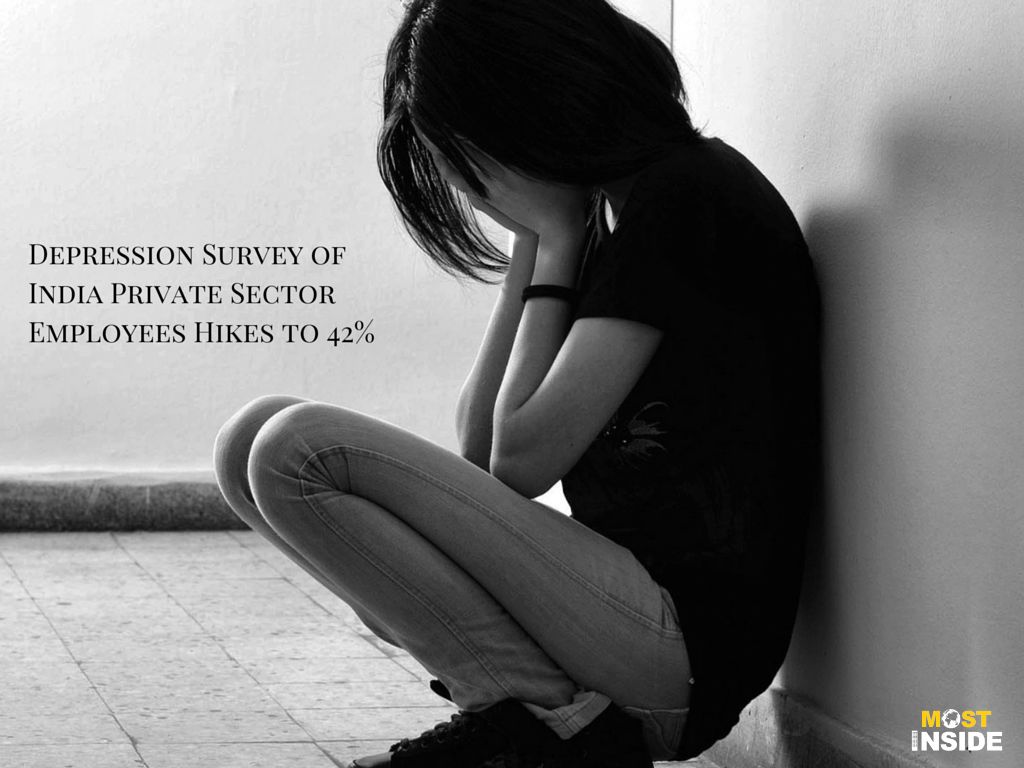Depression Survey of India Private Sector Employees Hikes to 42%
This post was last updated on July 22nd, 2019

Depression which is a mental disorder has been maintaining a consistent attention of researchers in India. Depression is somewhat like feeling lost and low which is a serious condition fighting with day to day life and ultimately leaving us hopeless and directionless. Over the last 5-6 decades, there has been discovered a large number of studies from India addressing multiple aspects of this mundane prevailing disorder. The various studies included psychological risk factor, epidemiology, demographic, neurobiology, comorbidity, symptomatology, assessment and diagnosis, depression impact, treatment related studies and prevention of depression along with the efficiency and tolerability of multiple antidepressants. Here is the latest depression survey reviewed data on Indian Private Sectors Employees which has escalated to 42%. Read further…
Depression Survey Report
Approximately, 42.5% of private sector employees in India are suffering from depression or common anxiety disorder because of the hectic and demanding schedules of work life, high stress levels and performance-linked fringe benefits, according to the recent research study of World Health Day.
Delhi, the Capital of India is ranked first in terms of number of corporate employees who are suffering from depression and general anxiety disorder, which is followed by cities like Bangalore, Mumbai, Ahmedabad, Chandigarh, Hyderabad and Pune.
The study by World Health Day surveyed that employees and workers from 17 broad sectors, with utmost share coming from IT/ITes and BPO sector at 17%.
The percentile rate of emotional issues such as anxiety, sadness and depression has hiked by 45-50% in the last eight years, as per the Assocham industry study revelation. The Secretary General of Assocham Mr. D.S. Rrawat said that the corporate employees and agents have to sustain and survive the tough and inflexible global environment to rescue and preserve their jobs, even if they have to add some extra pressure on health leading to silent health issues.
Furthermore, 23 percent of corporate employees are suffering from acute obesity which can transform occupational anguish and misery, mortality and risky injuries that can affect workplace absence, disability, poor productivity and healthcare costs in future aspects.
High blood pressure and diabetes diseases are the third and fourth-largest health issues sharing of 9 per cent and 8 per cent respectively. Other health issues suffered by corporate employees are spondylosis which shares 5.5%, heart disease 4%, cervical 3%, asthma 2.5%, slip disk 1% and arthritis 1.5%.
This survey report is based on the opinions and views of 1,250 corporate employees and agents from entire 150 companies all across the 18 broad sectors like IT/ITeS, engineering, telecom, financial services, FMCG, infrastructure, media, real estate, education, manufacturing and advertising, among others. However, the report considered major cities like Delhi-NCR, Mumbai, Pune, Bangalore, Chennai, Kolkata, Ahmedabad, Hyderabad, Chandigarh and Dehradun etc.
Analyzing and recognizing the causes of the health issues, the study discovered that nearly 38.5% corporate employees get sleep less than 6 hours a day which is too miserable due to high stress levels which evolves from the tough targets set by employers. Stress and depression could no doubt make the person sleep deprived which could even lead to poor performance at work and less productivity. Coming to physical fitness, it was revealed that around 57% of the employees in the private organizations said that they do not exercise or workout at all, and 23% do physical workouts for less than 1 hour per week, and 12% of the employees exercise for 1-3 hours per week, 8% give 3-6 hours per week and only 7 per cent stay fit by exercising and regular workouts for more than 6 hours a week.
Read: Things to Learn from Deepika Padukone’s Battle of Depression
Note
If depression could lead to poor performance and less productivity in work, then there is need for further research on factors like treatment and adherence and neurobiological correlates. There is a serious need to study of depressive disorders in India so as to discover the need and duration of continuation of the treatment. Studies should evaluate the cost-effective methods of treatment which could be easily used for the primary care setting to effectively treat the depression.
Recommended For You
Bridging the Gap: All About Dental Crown Bridges
Priyadarshini Muduli
A full time passionate writer with imperishable determination to bring healthy, smart and pragmatic changes individually and socially. Concentrate especially on lifestyle, life and personal improvement, relationships, mental health and behavior, viral issues and literature based subjects.




